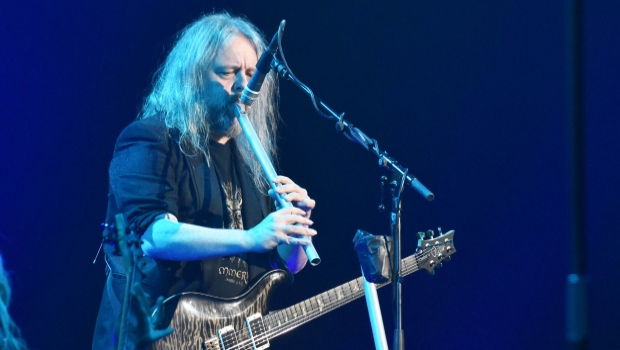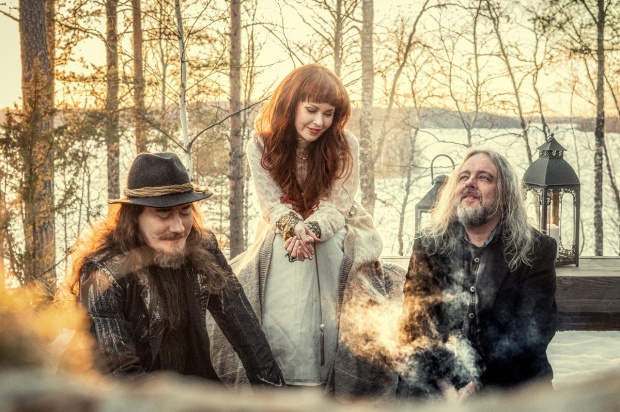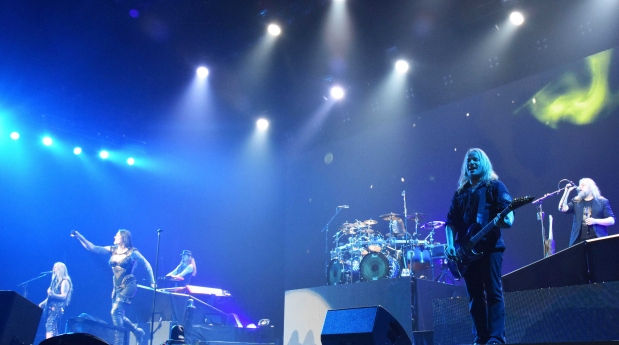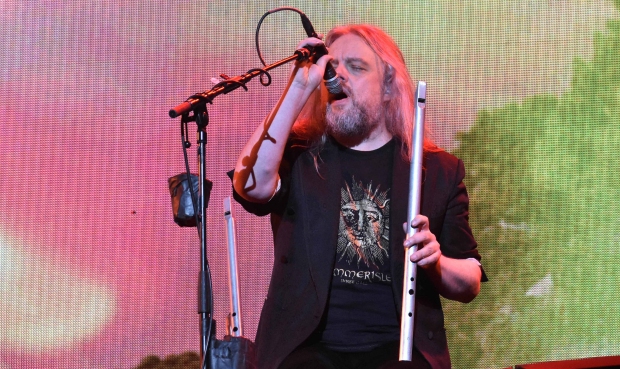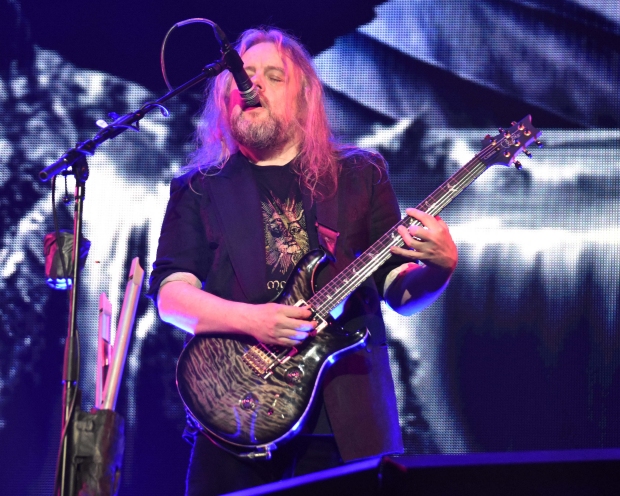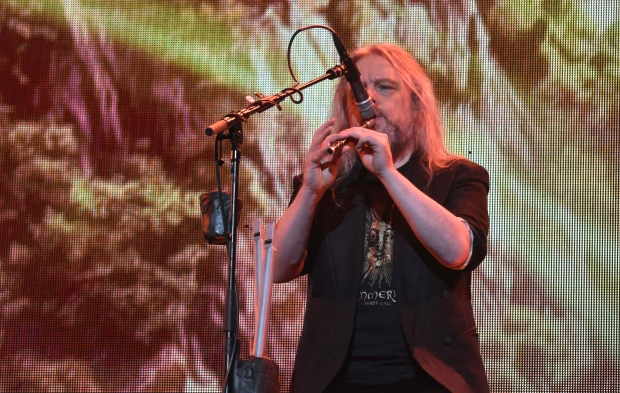As interest grows around the recently released sophomore Auri album, II – Those We Don’t Speak Of, TPA’s Geoff Ford caught up with the English multi-instrumentalist Troy Donockley, one-third of Auri and a key element in their parent band Nightwish.
Auri doesn’t instantly fit into any particular musical pigeonhole. Comprising Tuomas Hopolainen, founder of Finnish progressive/symphonic metal giants Nightwish, Tuomas’s wife, Finnish songbird Johanna Kurkela, and Nightwish guitarist/pipe player Troy Donockley, Auri has a distinctly individual sound that takes no cues from its grandiose metal roots. It leans more towards folk in a progressive rather than traditional way, atmospheric and mysterious. As such, it is sure to attract interest from Nightwish fans along with the folk community and anyone who just needs a beautiful album to help them chill out at the end of the day – the ultimate cross-over album.
Troy Donockley says the reaction to the album has been very positive.
“It has, it’s been wonderful! You never really know what’s going to happen with these things when you release an album, what the response is going to be like but we have an audience, from the first album, who like what we do, so that was kind of predictable. At the same time, it does seem to be crossing boundaries and we’ve also had fantastic responses from people we really admire, some writers and other musicians which is really nice.
“It went straight in at number two in the Finnish charts, above Drake and below Iron Maiden, so that’s pretty good as well. I think it’s just gone into the German charts at number 30 which is pretty impressive. It’s out there, we’ve let it go and it’s doing its thing.”
Troy had an amazing CV even before he first guested with Nightwish in 2007 (more of that later) and then officially joined the band in 2013. Given Troy’s background in traditional instruments, the Nightwish sound has shifted to make the most of his talents and the second half of last year’s Human.: II :.Nature album presented an atmospheric instrumental suite but this had no connection to the new Auri music.
“No, not at all”, Troy said. “Some of the music on the new Auri album was being fermented before Human Nature. Obviously the two run together, Nightwish and Auri are akin, but no, there was no explicit connection at all between Auri II and Nightwish Human Nature. Even though it runs on the same fuel, Auri is a completely separate entity. It’s not symphonic metal but there are a lot of symphonic elements to Auri, of course. It’s just in our blood.”
Auri’s eponymous debut album was released in 2018, but this came some years after the idea was conceived.
“Yes, the first Auri album was a long time coming but that had been planned since 2011”, Troy explained. “Johanna and I had intended to do an album together, initially I was going to produce one of her albums. She’s quite a popular contemporary artist in Finland and she wanted to spread her wings a bit but she didn’t want to be involved with pop music. I was drafted in to produce an album but the record company didn’t like that I was putting forward pieces of music that lasted more than three-and-a-half minutes. They weren’t happy, so we decided that we would go it alone.
“I wrote some songs for her with the view to her doing a solo album. Then we decided to collaborate and do it as a duo and, after multiple fine nights around the campfire drinking superb bottles of wine, we decided that we would do it as a trio because Tuomas was such a part of it as well. He has the same interests as me and Johanna, we’re very close and similar in our tastes.
“That’s when we became a trio and the first album which we did, after the (2015) Nightwish album Endless Forms Most Beautiful, kick-started dear old Tuomas’s creative juices to write the Nightwish album. Tuomas writes the songs for Nightwish but Auri is a collaborative effort. We all three of us write songs, three or four songs each for each of the Auri albums, and then we threw them at each other to embellish. Luckily for us, because we’re all such close friends, we don’t have any ego driving anything, so we are hugely lucky, there. We don’t have to struggle to have our voices heard.”
Before he discovered metal, Tuomas’s early background was influenced by classical elements, not dissimilar to Troy’s, so it appears their coming together was a meeting of minds.
“That’s true. It’s uncanny, when we first met back in 2007, our interests were quite… uncanny is the only word I can think of. They were so tuned to each other, it was like a joke to the pair of us just how close we were on our interests. We decided to distil them which did, in fact, end up as Auri – and Nightwish – because the direction of Nightwish has changed since I first met them back in 2007. I think that the last two albums, in particular, are much more to my liking”, he laughs, “because I do come from a progressive rock background and the progression of Nightwish over the last ten years has been a delight.”
I pointed out that I don’t see Nightwish as a metal band, to me they are firmly in the progressive arena.
“Well, that’s splendid to hear, Geoff, because that’s the way I always saw it as well. I was never into metal, either, when I was a kid and when I first heard Nightwish, even though it was sent to me as a metal band. The moment I heard it I thought ‘This isn’t metal, this is something else’, which is why Nightwish is such a splendid home for me. Nightwish is very open minded in its direction, so I feel I belong in it.”
It appears that Nightwish and Auri are simply an extension of what Troy has been doing for most of his career.
“That’s exactly what’s going on. I haven’t really changed since I was a kid, I’m still ploughing the same path. My musical world, my musical vision is still undimmed, even in these tricky times of Spotify and social media, I’m still ploughing my furrow.
“Funnily enough, I just got a message this morning telling me it’s 23 years since my first solo album came out, which is quite a thought and really bizarre, quite surreal. I’ll have to mark it, maybe, on it’s 25th anniversary, I’ll probably do something with it then, maybe a live concert or something.”
Although Troy may not be a household name, if he were to plan such an event, he would have some pretty big names upon which to call for support.
“Yeah, quite right! That’s been one of the great advantages of my personal trajectory, the meetings with fantastic musicians, my address book has a lot of interesting characters in it! And lots of them were massive heroes of mine when I was a kid. So, I’m mightily privileged to have such splendid musical friends out there.”
Troy was born in Workington, Cumbria, into a musical family. His parents were in a folk group Travelling Country, well known in the area and, at the age of 16, Troy joined the band for an early introduction to working live.
“An early introduction to the hazards of working men’s clubs as well”, he laughs. “It was, truly, the wild west! I grew up on the west coast of Cumbria and a lot of those gigs I used to do with my mum and dad, it was very ‘outlaw’ where all kinds of weird stuff happened which came in really handy for my future work.
“They took me out on the road with them, semi-professionally, we used to just do weekends. My dad, especially, set the ground work for me. It was he who encouraged me and got me into all kinds of wonderful, whacky and wild music when I was a kid. I used to take advantage of his record collection. Ozark Mountain Daredevils, New Riders of the Purple Sage, all that stuff that he was right into, and I was too, along with Neil Young. At the same time my dad was also heavily into the likes of Pink Floyd and he particularly loved Rick Wakeman, so I remember listening to Journey to the Centre of the Earth when I was about 11. It was a wonderful musical upbringing I had.
“I suppose, because Cumbria’s kind of, geographically, a bit cut-off, there was a strange musical culture. Black Sabbath had their first gig as Black Sabbath on the west coast of Cumbria, in Egremont, I believe. West Cumbria had a strange and wonderful musical palette, it had all kinds of stuff going on. It was a bit like the dance band culture in Ireland, with country music, very bizarre but wonderful! It was a wonderful foundation for me.”
Troy’s signature instrument is the uilleann pipes, a traditional Irish form of the bagpipes, played sitting down and powered by a bellows under the arm. Whilst they captivated the young Donockley, he began his musical journey in a more conventional manner.
“I started with the guitar when I was 12. My dad played guitar, really simple, three-chord stuff but I fell in love with the sound of the uilleann pipes a bit earlier. I always loved ’em but I couldn’t quite figure out what they were. As a physical instrument I had no idea what they looked like because they were so obscure, then, nobody played them.
“I got heavily into the sound and the more I heard them, the more I wanted to understand them. Eventually, when I was about 17 or 18, my dad lent me some money to buy a half-set which were in Kendal. So, I trundled down there and then wheezed my way though months and months of trying to come to terms with them, much to the agony of my parents. Once you’re bitten by that bug, there’s no stopping! I couldn’t do anything or be anywhere without them.
“At the same time, I was still playing guitar and trying to get into bands, still trying to realise myself as a musician but the uilleann pipes became a distinctive voice for me and people started to hear about them. Then I formed a, kind of, Celtic-rock band in 1987 called You Slosh and we used to play all over the UK and abroad.
“That started to really gather momentum but blew itself up after five years although, in that time, I did meet lots and lots of people, some interesting characters, and I started doing lots of sessions on other people’s records. I was playing pipes on a Barbara Dickson album and I met Pip Williams who was doing the orchestral arrangements for Nightwish and the rest is history.
“The uilleann pipes are very much trapped within traditional music and there’s a lot of snobbery about them, there always has been. It’s the same with any kind of traditional instrument. They find themselves suffocated by expectation but, with me, I never wanted to be a traditional player, I wasn’t interested in playing in a folk band. I always saw the uilleann pipes as my voice, as a voice that I wanted to use in rock music.
“The uilleann pipes and the electric guitar, they were the same voice, to me. Indeed, it’s been said to me ‘You play guitar just like you play the pipes.’ That is a massive compliment because that’s what I always intended to do, use these instruments for my own personal expression. And, when I did take the pipes into rock music, the Uilleann Pipe Society had a fatwa on me! They really didn’t like it up ’em!.
“it’s the same applies through history. My great hero of the uilleann pipes was Liam O’Flynn, who was in a band called Planxty, and he was seriously… well, it was worse than Bob Dylan. He was really slagged off for playing the uilleann pipes with an acoustic guitar accompaniment. That’s how bad it was, the terrible closed-mindedness of the folk scene, as it was back in the sixties. Dylan went through that and Liam O’Flynn had the same thing when he started to play the pipes with an acoustic guitar.
“So, playing the uilleann pipes in a symphonic metal band”, he laughs, “good grief!
“I think times have changed, thankfully. I think one of the great delights of my life is that I’ve managed to expose the beauty of the uilleann pipes to people in South America and Australia and Antarctica, all over the world. I get messages from kids wanting to learn how to play the instrument and that, to me, is wonderful.”
And so to Troy’s incredible CV which includes Roy Harper, Midge Ure, Del Amitri, the movie soundtrack for Ridley Scott’s Robin Hood, Status Quo and Bruce Johnson of the Beach Boys.
“Yeah”, he laughs again, “Bruce Johnson! I met Bruce Johnson when Beach Boys were playing with Status Quo. I did an album with Status Quo and then they did a big showcase show at Brixton Academy in London, The Beach Boys were doing backing vocals. I met Bruce there, he’s a lovely guy.
“Backstage I had a fantastic… an opportunity, really, to meet them and to play the pipes to them. Brian Wilson, went ‘Will you let us hear how this thing sounds?’ I got the pipes out and was playing the pipes to The Beach Boys! That was surreal enough.
“And then Brian came up to me, after I’d stopped playing, and he went ‘Listen son, where does the sound come out of those cats?’ It was priceless!
“That’s how I met them but, the thing is, Geoff, it’s a domino effect, you meet one guy and then something else crops up out of that. All kinds of things happened through that Status Quo show. At that show, I met Maddy Prior and I went on to co-produce six albums with Maddy.”
Troy was also one half of the Bad Shepherds with comedian Adrian Edmondson (vocals, mandolin) playing punk and new wave classics as, primarily, an acoustic duo, which looked like great fun.
“It was! The Bad Shepherds came along at a time when I wasn’t expecting it”, says Troy. “I got a call from Ade and we must have spent about two hours on the phone talking about the idea. When we got together, we realised it had legs and we could do something fun with it. It was a big fun band. We didn’t intend to record, or anything with it, just go out and do a few gigs but we ended up doing it for about five years, all over the world! We had a fantastic time, a wonderful experience!”
Speaking to Troy, his passion for his music is infectious and there is this overwhelming sense of career satisfaction, that he has been able to maintain the integrity of the vision he set out with as a young musician.
“I’ve had a wonderful career, as it is, even the small episodes, the tiny things that have happened. I’ve always had a wonderful time. I’ve spent so much time with other people. I did a lot of work with Midge Ure, we spent a lot of time together, touring Maddy Prior and Barbara Dickson and everything. I was in Iona for 14 years, I had a wonderful time there. I tend to lock in to wherever I am, whatever I’m doing, and I become absorbed by it, just live in it, fully.
“I think Nightwish is the closest to me, not my ambitions but my direction and the stage and the facility. Nightwish, that’s where I am now, it’s where I’ve ended up but wherever I am, that’s where I’m happiest!”
You can read Geoff Ford’s review of Auri’s II – Those We Don’t Speak Of HERE on TPA
[Live Photographs by Geoff Ford | Promotional Photograph courtesy of Mikko Linnavuori]
LINKS
Troy Donockley – Website | Facebook

